I do not glorify the hustle. I am very anti-hustle culture and aim for productivity focused on prioritizing goals for the next life (akhira) + this life (dunya) in that order. I adhere to the “soft-life” which basically means working for myself for time and schedule flexibility & with the clients that I enjoy working with while making time for my religious obligations and Islamic & nutrition/functional medicine learning in my free time along with prioritizing my self-care routine.
My Morning and Evening Routine as a Health and Wellness Functional Practitioner:
Morning Routine:
My morning starts with a good sleep routine. Try to figure out how many hours of sleep per night you need to feel at your best. A good sign of a deep well-rested sleep is waking up energized and ready to start the day (as opposed to groggy or moody). On days when I get less sleep than usual, I make it a point to nourish my body with a breakfast rich in high-quality protein. This helps support my mood, energy levels, maintain cortisol balance, stabilize blood sugar, and support my nervous system throughout the day.
I open the ultrahuman ring app and look at my sleep score after Fajr. Sometimes, I take a little nap after Fajr to catch up on sleep.
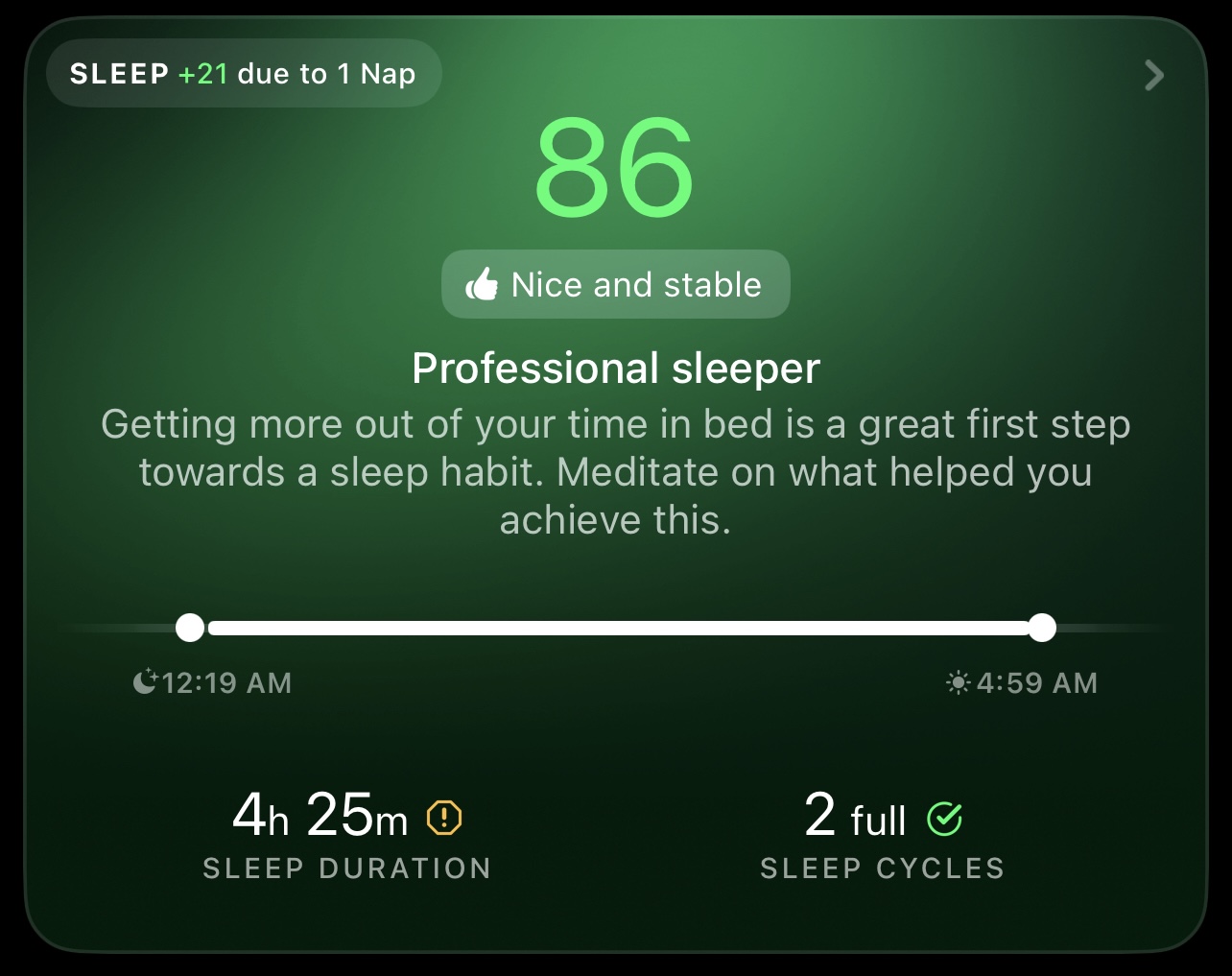
Morning sun + earth time (grounding): I try to get sunlight in my eyes to regulate my sleep-wake cycle (circadian rhythm) and to help with serotonin production usually by sitting outside, reading, or working/learning on my laptop. There’s a saying called “go touch grass” aka get back in touch with reality and I literally love doing that on a daily basis as part of my self-care routine aka grounding.
Quran: Quran memorization using Tarteel app
Hadeeth: Hadeeth memorization using Wahi app 🤍
Morning prayer: Tahajjud, Fajr + Sunnah, Doha.
“The dua made at Tahajjud is like an arrow which does not miss its target” – Imam Ash-Shafi’i
Sunnah prayers: The 12 Sunnah prayers are 2 rakahs before Fajr, 4 before and 2 after Dhuhr, 2 after Maghrib, and 2 after ‘Isha. Look up the benefits of praying all 12 sunnah prayers. That will help motivate you for the long-term reward as well as for making up for any deficiencies in the fard (obligatory) prayers.
Tip: don’t think of the sunnah prayers as optional – bunch it together with the fard prayers.
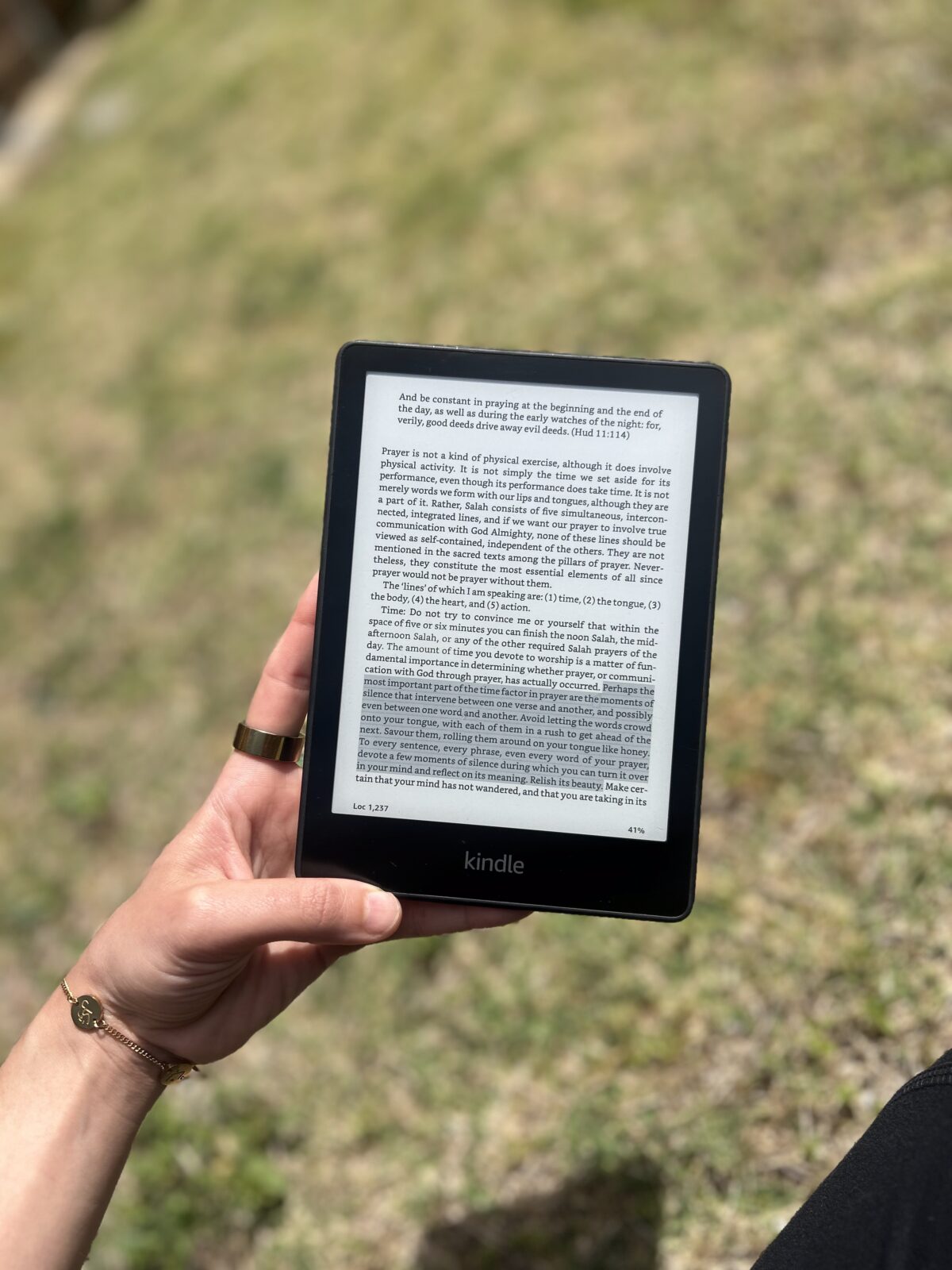
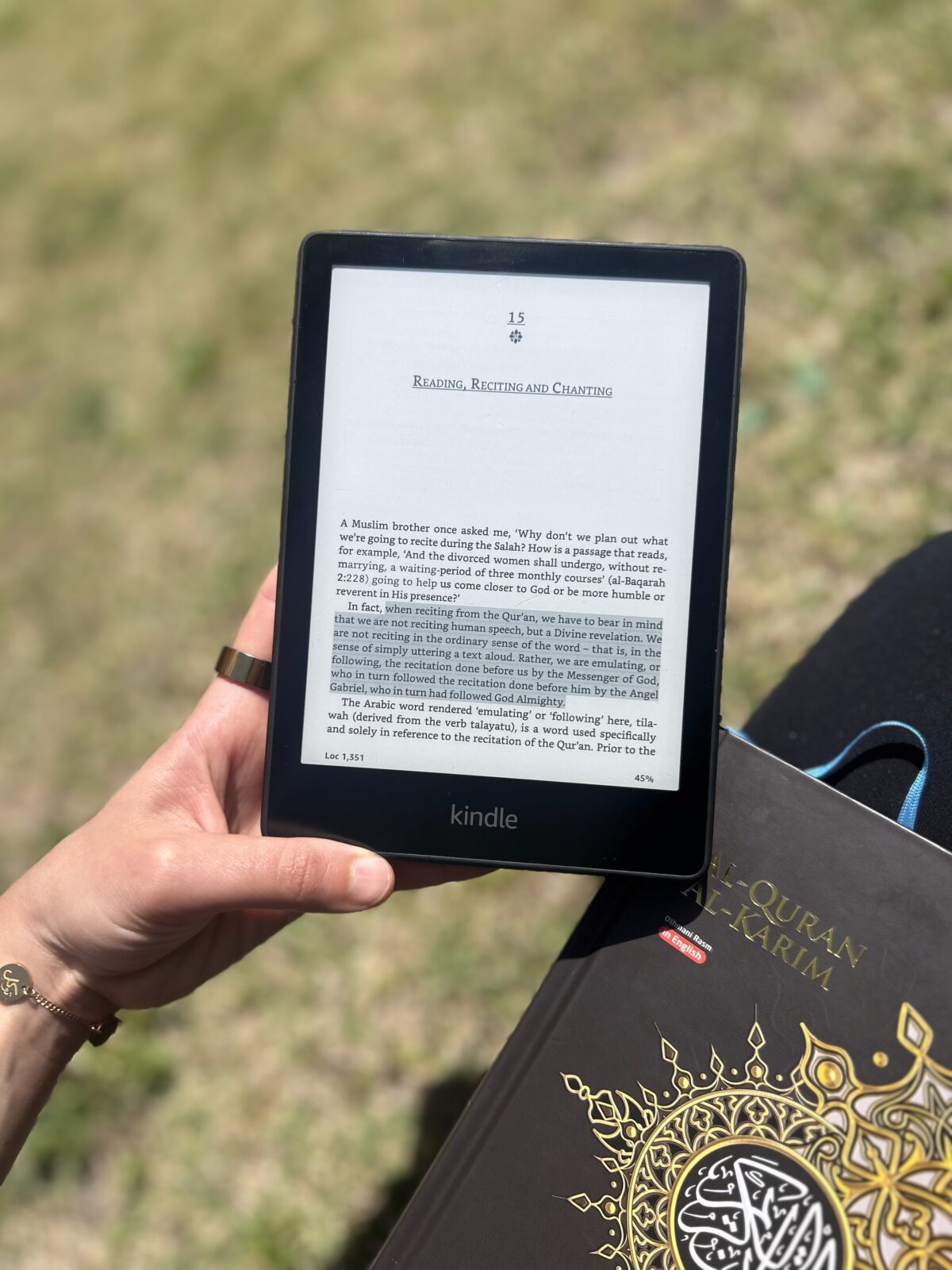
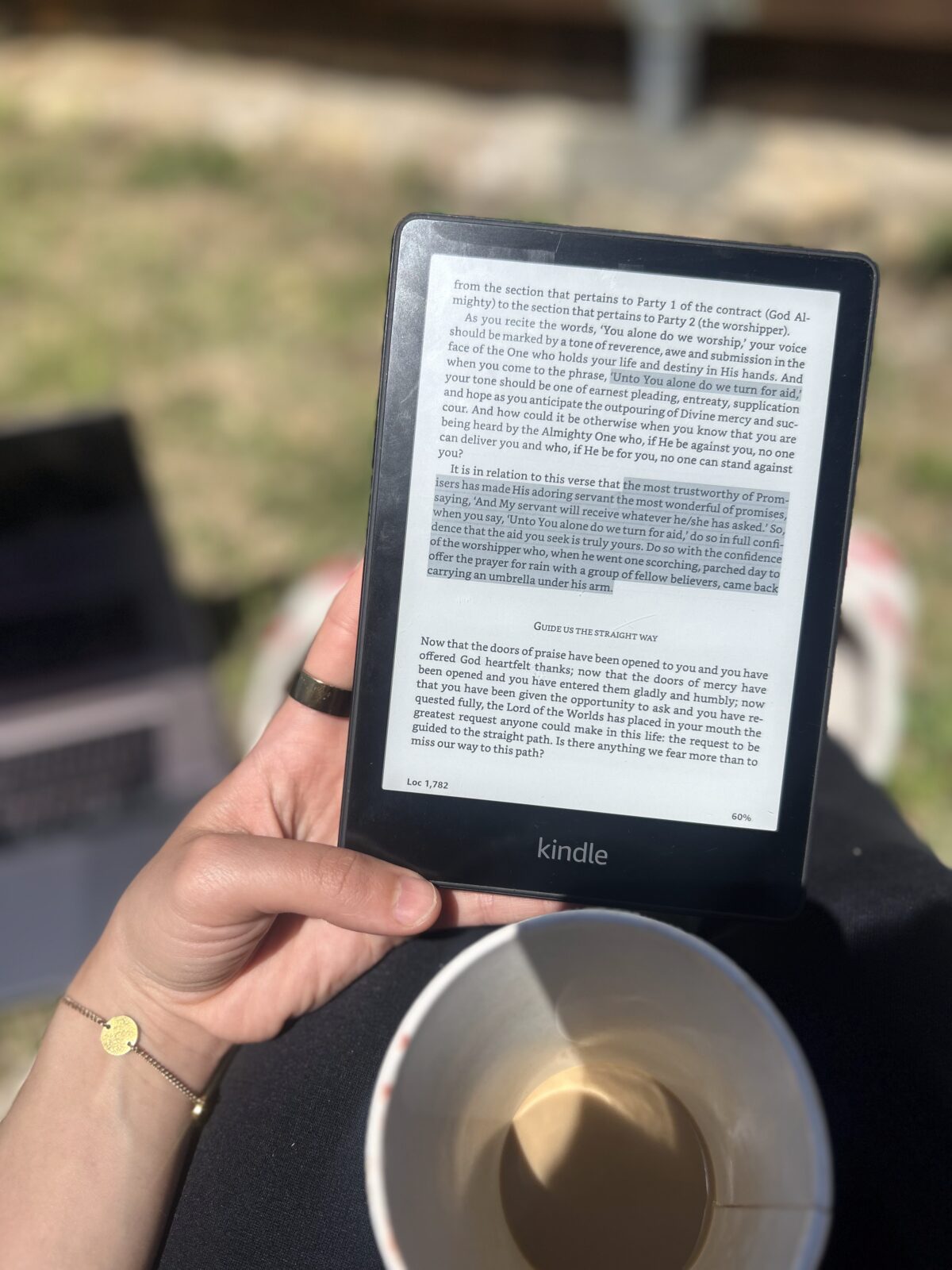
The Messenger of Allah ﷺ said, “Hold on tight to the night prayer. Indeed it is the habit of the righteous who came before you. It brings you close to your Lord, wipes away your sins, prevents you from sinning and repels sickness from the body” (Tirmidhī).
The Messenger of Allah ﷺ said, “There are three people whom Allah loves, is delighted with and smiles at…[Of them is] a man who has a beautiful wife, and a comfortable bed. He then gets up to pray (at night), so Allah says to His Angels, “My Angels, look! This is My servant. He has a comfortable bed and a beautiful wife, but he left them both. He then stood to pray, humbly begging Me, and reciting My verses. And if he wished, he could have slept…” (Ḥākim).
Morning adkhar: recite the morning adhkar for spiritual protection + barakah during the day using the Dhikr & Dua app. Look up the benefits of reciting the morning and evening adhkar to stay motivated. We need the extra support in this world and to boost up our spiritual health and energy using dhikr/quran, dua, and tahajjud. We aren’t only a physical body, we are a soul (ruh) encased in a physical body within it the three levels of our nafs. We have to prioritize and take care of all three: our spiritual, physical, and emotional health.
‘The morning and evening adhkār play the role of a shield; the thicker it is, the more its owner is protected. Rather, its strength can reach to such an extent that the arrow shot at it will bounce back to affect the one who shot it.’ – Ibn al-Qayyim (raḥimahullāh)
أَصْبَحْنَا وَأَصْبَحَ الْمُلْكُ لِلَّهِ، وَالْحَمْدُ لِلَّهِ، لَا إِلَهَ إِلَّا اللَّهُ وَحْدَهُ لَا شَرِيكَ لَهُ، لَهُ الْمُلْكُ وَلَهُ الْحَمْدُ، وَهُوَ عَلَى كُلِّ شَيْءٍ قَدِيرٌ. رَبِّ أَسْأَلُكَ خَيْرَ مَا فِي هَذَا الْيَوْمِ وَخَيْرَ مَا بَعْدَهُ، وَأَعُوذُ بِكَ مِنْ شَرِّ مَا فِي هَذَا الْيَوْمِ وَشَرِّ مَا بَعْدَهُ، رَبِّ أَعُوذُ بِكَ مِنَ الْكَسَلِ وَسُوءِ الْكِبَرِ، رَبِّ أَعُوذُ بِكَ مِنْ عَذَابٍ فِي النَّارِ وَعَذَابٍ فِي الْقَبْرِ.
“We have entered upon a new day and the dominion belongs to Allah, and all praise is for Allah. There is no deity except Allah, alone without partner. To Him belongs the dominion and to Him belongs the praise, and He is capable of all things. O Lord, I ask You for the best of this day and the best of what follows it, and I seek refuge in You from the evil of this day and the evil of what follows it. O Lord, I seek refuge in You from laziness and from a bad old age. O Lord, I seek refuge in You from the punishment of the Fire and from the punishment of the grave.”
بِسْمِ اللَّهِ الَّذِي لَا يَضُرُّ مَعَ اسْمِهِ شَيْءٌ فِي الْأَرْضِ وَلَا فِي السَّمَاءِ وَهُوَ السَّمِيعُ الْعَلِيمُ
“In the name of Allah, with whose name nothing on earth or in the heavens can cause harm, and He is the All-Hearing, the All-Knowing.” (Recite 3x)
اللَّهُ لَا إِلَٰهَ إِلَّا هُوَ الْحَيُّ الْقَيُّومُ ۚ لَا تَأْخُذُهُ سِنَةٌ وَلَا نَوْمٌ ۚ لَّهُ مَا فِي السَّمَاوَاتِ وَمَا فِي الْأَرْضِ ۗ مَن ذَا الَّذِي يَشْفَعُ عِندَهُ إِلَّا بِإِذْنِهِ ۚ يَعْلَمُ مَا بَيْنَ أَيْدِيهِمْ وَمَا خَلْفَهُمْ ۖ وَلَا يُحِيطُونَ بِشَيْءٍ مِّنْ عِلْمِهِ إِلَّا بِمَا شَاءَ ۚ وَسِعَ كُرْسِيُّهُ السَّمَاوَاتِ وَالْأَرْضَ ۖ وَلَا يَئُودُهُ حِفْظُهُمَا ۚ وَهُوَ الْعَلِيُّ الْعَظِيمُ
“Allah! There is no deity except Him, the Ever-Living, the Sustainer of existence. Neither drowsiness overtakes Him nor sleep. To Him belongs whatever is in the heavens and whatever is on the earth… Who is it that may intercede with Him except with His permission? He knows what is before them and what is behind them, and they do not comprehend anything of His knowledge except what He wishes. His seat embraces the heavens and the earth and He is not wearied by their preservation, and He is the All-exalted, the All supreme.”
اللهم إني أسألك العفو والعافية في الدنيا والآخرة، اللهم إني أسألك العفو والعافية في ديني ودنياي وأهلي ومالي، اللهم استر عوراتي وآمن روعاتي، اللهم احفظني من بين يدي ومن خلفي وعن يميني وعن شمالي ومن فوقي وأعوذ بعظمتك أن أُغتال من تحتي
“O Allah, I ask You for well-being in this world and the next. O Allah, I ask You for forgiveness and well-being in my religion, in my worldly affairs, in my family and in my wealth. O Allah, conceal my faults and calm my fears. O Allah, guard me from in front of me and behind me, from my right, and from my left, and from above me. I seek protection in Your Greatness from being unexpectedly destroyed from beneath me.”
Supplement Routine:
| Morning Supplements | Evening Supplements |
|---|---|
| 1 capsule Magnesium Glycinate (120 mg) to activate Vitamin D | 1 capsule Magnesium Glycinate (120 mg) to support deep sleep + relaxation |
| 1 capsule Ashawagandha KSM-66 (500 mg) occasionally for stress resilience | 1 capsule Ashawagandha KSM-66 (500 mg) occasionally for stress resilience |
| 1 capsule Vitamin D3 + K2 (5,000 IU or 10,000 IU daily) | Celtic sea salt under tongue to replenish needed minerals |
| Celtic sea salt under tongue to replenish needed minerals | L-theanine |
| 1 capsule Lions mane (500 mg) occasionally for focus | |
| MegaSporeBiotic (Spore-based Probiotic) |
Dhikr: أَلاَ بِذِكْرِ اللَّهِ تَطْمَئِنُّ الْقُلُوبُ – “Verily, in the remembrance of Allah do hearts find rest, inner peace, tranquility. “The key to contentment is in dhikr (remembering Allah). When you constantly and consciously remember Him, your heart relaxes and becomes attached to the One who controls all affairs. With sincerity, persistence and consistency, you reach a stage where nothing compares to the sweetness of remembering, worshipping and spending time alone with Him. Ibn al-Qayyim (raḥimahullāh) explains that if there was no reward for dhikr other than the joy and pleasure it brings to one’s heart, this would be enough.“
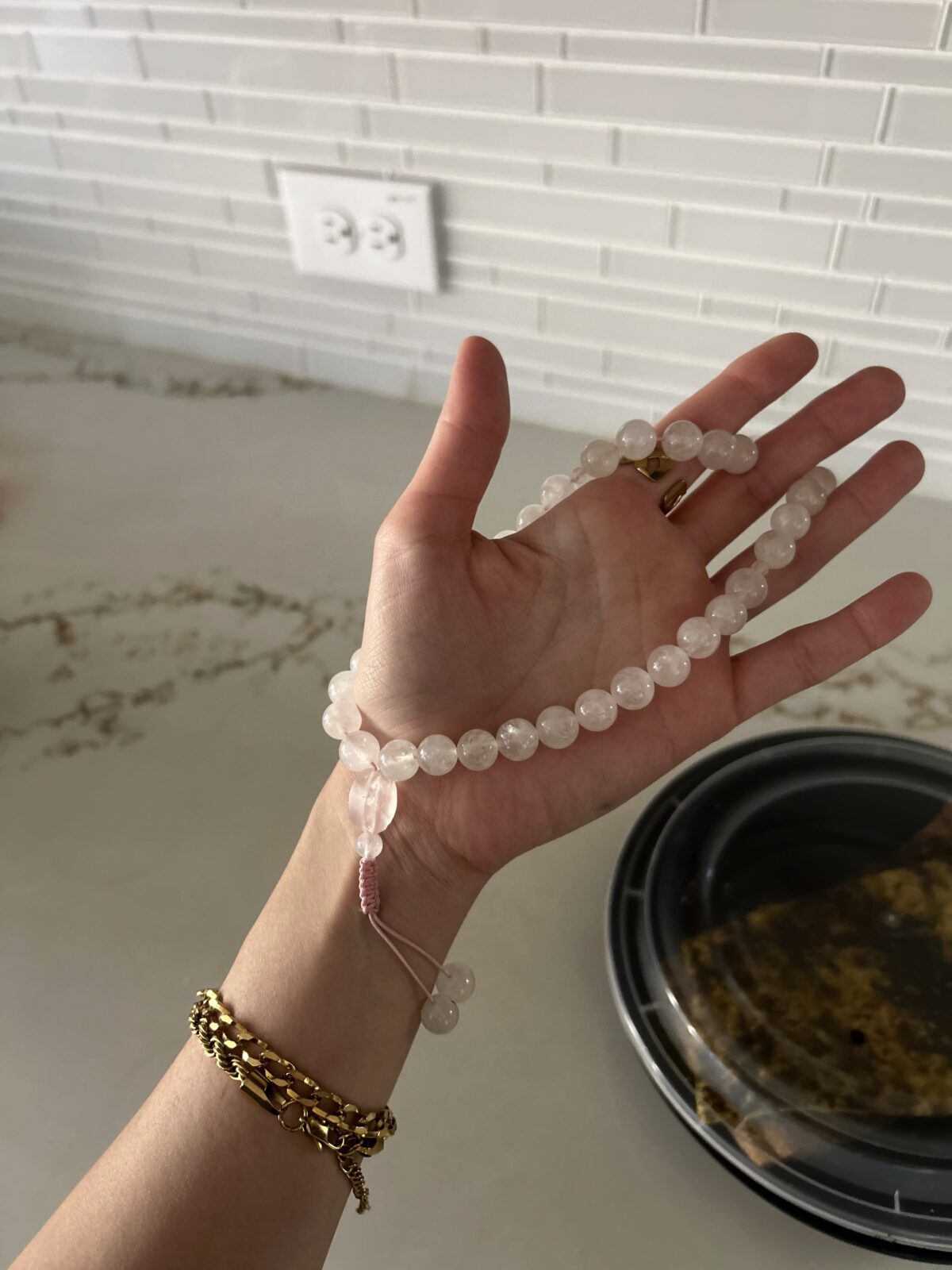
The Messenger of Allah ﷺ said, “The parable of the one who remembers his Lord and the one who does not is like the parable of the living and the dead” (Bukhārī).
He also ﷺ said: “The people of Paradise will not regret anything, except for those moments in which they did not remember Allah” (Ṭabarānī).
ʿAmr b. ʿAbdillāh (raḥimahullāh) said, “On the Day of Judgement, when the veil revealing the rewards of actions is lifted, people will not see any action with greater reward than dhikr. Then, some people will feel regret and say, ‘There was nothing easier for us than doing dhikr.’”
“Dhikr is a powerful tool to reduce stress and anxiety. It positively impacts your mental health.”
“Dhikr will give you meaning and it will repurpose your life to make it about pleasing Allah. Instead of experiencing existential angst, you will become clear about your goals in life.“
“Much of our anxiety stems from our unhealthy attachment to this world. The more dhikr you do, the less you will worry about it. You will realise what really matters.”
Know and internalize Allah’s names: Know your lord
Tazkiyat Al-Nafs: Istighfar, Salawat, Surah Al-Baqarah, Sadaqah. The inner self (nafs) is purified through ṣalāh, reciting the Qur’ān, doing dhikr and making duʿā. Thus, remembering Allah consistently during these times purifies the soul and trains the nafs. By having a strict regimen of daily dhikr, you are developing mastery over your nafs and this will — by Allah’s permission — lead to your soul being purified and your heart becoming illuminated.
Istighfar: The different forms of Istighfar.
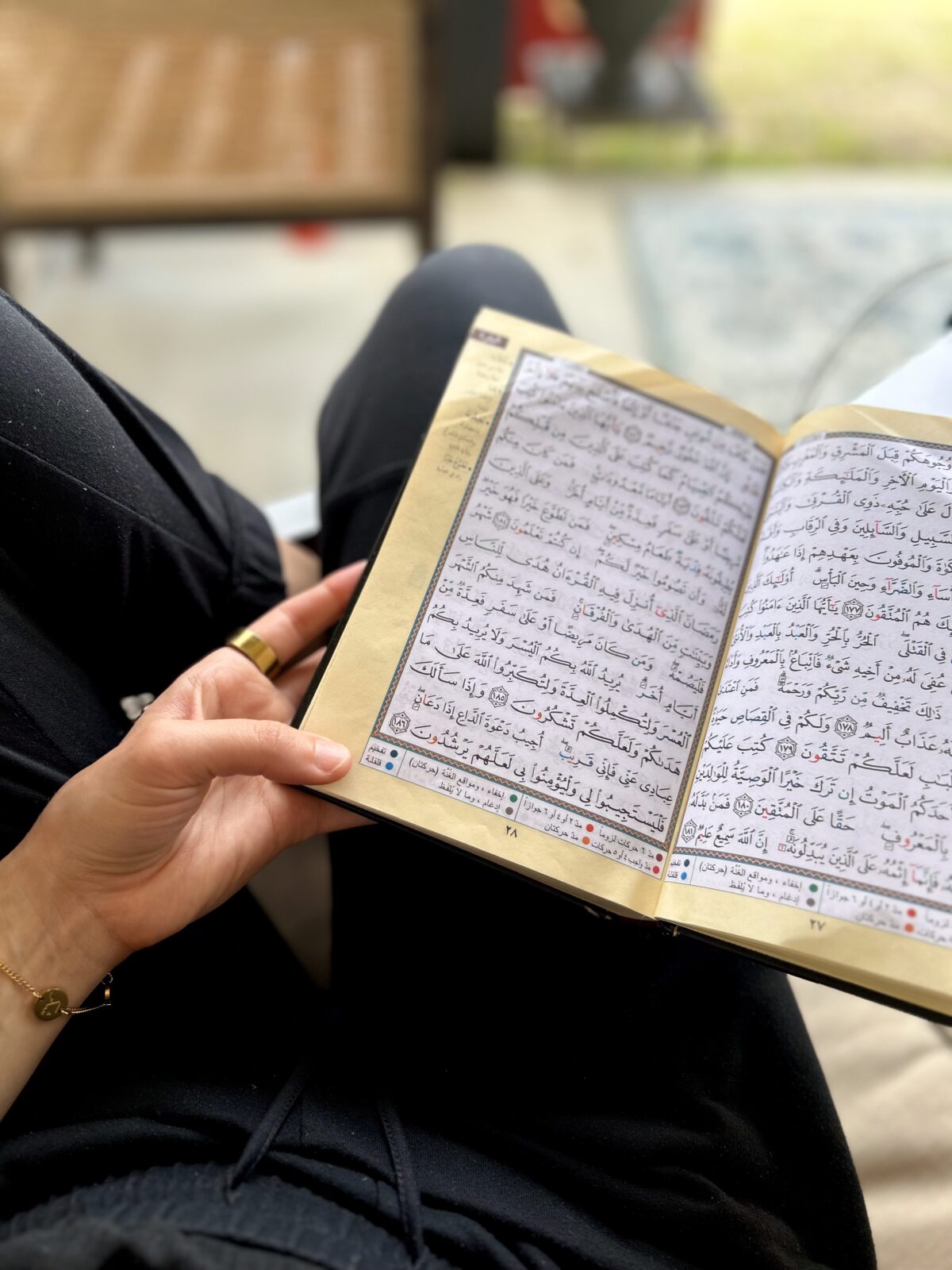
Once you reach ayah 152, 153, 155, 156, 186, 214, 274, 255 (!), & 286 in Surah Al-Baqarah, it’s a constant reminder (and the best nervous system regulation tool/best mental health hack) of Who is in control of everything.
وَإِذا سْأَلِتْ فاسْأَلَ الله
If you ask, then ask Allah [alone]
If you’re going to ask, ask Allah. Trust Him. Nobody else will give you the outcome that you want.
“One of the best ways to purify the soul is to always remember and think that Allah is with you. A Companion asked the Messenger ﷺ, “What is the tazkiyah (purification) of oneself, O Messenger of Allah?” He ﷺ replied, “To know that Allah is with him wherever he may be” (Ṭabarānī). This close connection with Allah, where we are always mindful of Him, makes us aware of what thoughts and feelings we let into our hearts. This helps us to purify our negative thoughts and actions, including the ill-feelings we have towards fellow believers, and the whisperings of shayṭān.”
Allah’s Messenger ﷺ said: “صَلُّوا عَلَيَّ فَإِنَّهَا زَكَاةٌ لَكُمْ Send salawat upon me, for verily it is a purification for you.”
The Messenger of Allah ﷺ said, “The closest of people to me on the Day of Judgement will be those who send the most ṣalawāt upon me” (Tirmidhī).
Dhikr after prayer: سبحان الله Subhanallah 33x + الحمد لله Alhamdulillah 33x + الله أكبر Allahu akbar 34x
The Messenger of Allah ﷺ said, “There is none better in the sight of Allah than a believer whose life is lengthened in Islam and who frequently utters takbīr, tasbīḥ, tahlīl and taḥmīd” (Aḥmad).
The Messenger of Allah ﷺ said: “Indeed what you remember of Allah’s Glory (by uttering) tasbīḥ, takbīr, tahlīl and taḥmīd gather around the Throne of Allah, buzzing like bees, mentioning to Allah the person who uttered them. Do you not wish to have someone who mentions you by Him?” (Ibn Mājah)
Tip: Shaytan will tell you that you are busy and you don’t have “time” for this. Time was solely created by Allah for us to worship Him. Our sole purpose on this earth is to worship Him so sit back down. At the beginning, you might have to force yourself to remain sitting after the prayer to complete the dhikr. After a while it will become a habit and feel less like a chore. Then you reap the benefits of remaining close to Allah (ﷻ).
Pro tip: create a habit tracker checklist! You can’t improve what you don’t already track! This will help figure out what your baseline habits are. After two weeks if you aren’t consistently maintaining a goal to make it a habit, DON’T quit the goal completely. Instead downsize the goal to something more achievable. A tip that I always tell my clients: No matter what the goal is whether it’s health, nutrition, or a personal goal – never quit. Keep going. The journey there will be up and down but what matters is consistency. Progress over perfection. Tweak the goal a bit if it seems too big to handle right now. (and how boring would the journey be if it went smoothly. If you received everything you ever wanted, would you be satisfied? We need spontaneity in life to make it interesting. We need the “downs” to learn what’s not working and pivot.)
I wouldn’t consider myself type A personality. I just prioritize action over excessive analyzing. There should be a mix of going with the flow but also knowing where the flow is going while being aware that you can’t always control the flow. (The trick is to always stay connected with the One who knows where the flow is going.)
You don’t need to track everything. Take it all as extra data to improve your life and your habits. (which essentially dictates your life. Your life is shaped by your daily consistent habits.)


Allah’s Messenger ﷺ said: “اقْرَءُوا الْقُرْآنَ فَإِنَّهُ يَأْتِي يَوْمَ الْقِيَامَةِ شَفِيعًا لأَصْحَابِهِ اقْرَءُوا الزَّهْرَاوَيْنِ الْبَقَرَةَ وَسُورَةَ آلِ عِمْرَانَ فَإِنَّهُمَا تَأْتِيَانِ يَوْم الْقِيَامَةِ كَأَنَّهُمَا غَمَامَتَانِ أَوْ كَأَنَّهُمَا غَيَايَتَانِ أَوْ كَأَنَّهُمَا فِرْقَانِ مِنْ طَيْرٍ صَوَافَّ تُحَاجَّانِ عَنْ أَصْحَابِهِمَا اقْرَءُوا سُورَةَ الْبَقَرَةِ فَإِنَّ أَخْذَهَا بَرَكَةٌ وَتَرْكَهَا حَسْرَةٌ وَلاَ تَسْتَطِيعُهَا الْبَطَلَةُ Recite the Qur’an for on the Day of Resurrection it will come as an intercessor for those who recite It. Recite the two bright ones, Al-Baqarah and Surah Al ‘Imran, for on the Day of Resurrection they will come as two clouds or two shades, or two flocks of birds in ranks, pleading for those who recite them. Recite Surah Al-Baqarah for to take recourse to it is a blessing and to give it up is a cause of grief and the magicians cannot confront it.”
How I choose to nourish my body throughout the day:
Breakfast:
Beverages: collagen coffee (espresso, organic (most times) whole milk, collagen hazelnut creamer (10 grams of protein), + honey as the sweetener or monkfruit with erythritol/allulose or homemade chai with lots of fresh ginger, anise, and fennel.
High quality protein: pasture-raised eggs, homemade probiotic-rich yogurt with organic basil seeds (twice the fiber, potassium, iron, and calcium than chia seeds), leftover chicken, 100% grass-fed and grass-finished ground beef (sometimes halal), freshly cut turkey slices, cottage cheese (hide the texture in pancakes!)
Probiotic-rich foods: homemade probiotic-rich yogurt drizzled with honey,
Lunch:
High quality protein: halal organic chicken breast, 100% grass-fed and grass-finished ground beef (sometimes halal), freshly cut turkey slices,
Dinner:
High quality protein: halal organic chicken breast, 100% grass-fed and grass-finished ground beef (sometimes halal), homemade probiotic-rich yogurt, freshly cut turkey slices,
Snack:
Quick + easy: slices of freshly cut turkey wrapped in baby swiss cheese slices and broccoli or alfalfa sprouts drizzled with honey. Sometimes Boulder Canyon kettle style potato chips made with avocado oil. (Classic sea salt has only 3 ingredients: potatoes, avocado oil, and sea salt) Peeled chestnuts,
Probiotic-rich foods: homemade probiotic-rich yogurt with basil or chia seeds and drizzled with honey,
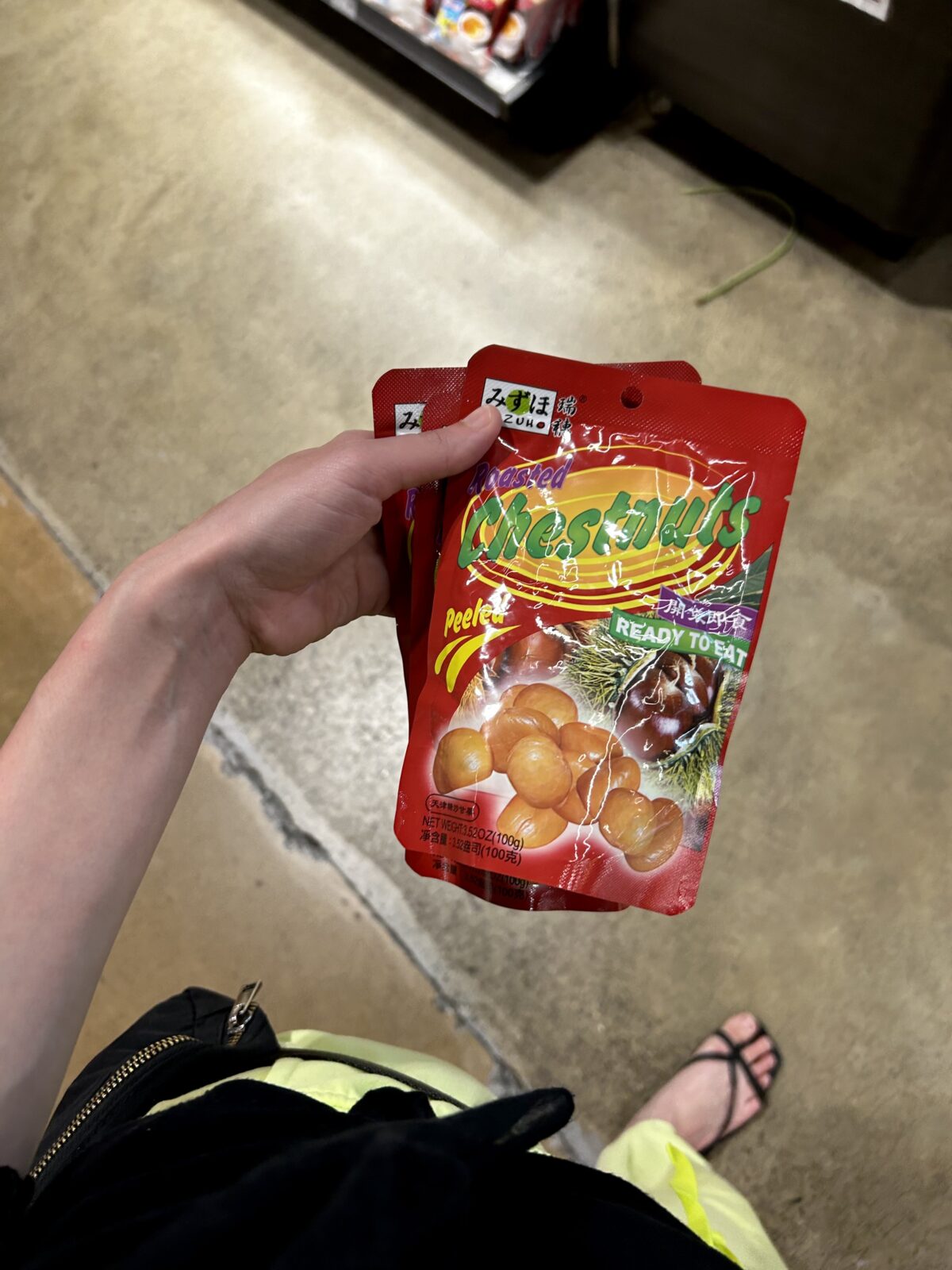
How I choose to work throughout the day:
Business (day): my sweet spot for staying sane is only taking on 3 clients daily. (my max is 4 clients) That could be a mix of initial consultations (60-90 minutes) or follow up sessions with long-term clients. Not every client is the right fit and that’s completely okay since we all have different needs, preferences, mentalities towards health/nutrition, etc.
Business (evening): finish up AI charting on client sessions for the day, reply back to client messages, file health insurance claims on clients seen for the day electronically, read up on interesting nutrition/health/functional medicine books on my kindle.
How I choose to move my body throughout the day:
Movement/Exercise: 10-20k steps daily. I can’t sit still for long periods of time. Some may diagnose that as having ADHD, I think as a culture we sit way too often and aren’t used to moving like our ancestors did hence the rising rates of obesity in the west. (along with the food that’s packaged with 20+ ingredients to extend shelf life and delay expiration dates so the company makes profit while the consumer’s health slowly declines feeding into the sick care hospital system. The same food companies that are poisoning us are creating medicinal supplements/drinks/pharmaceuticals to “cure” us within the healthcare system.)
I use the ultrahuman ring to track my activity/steps during the day.
For resistance training, I use 2 lb wrist weights while walking/jogging for extra resistance + toning.
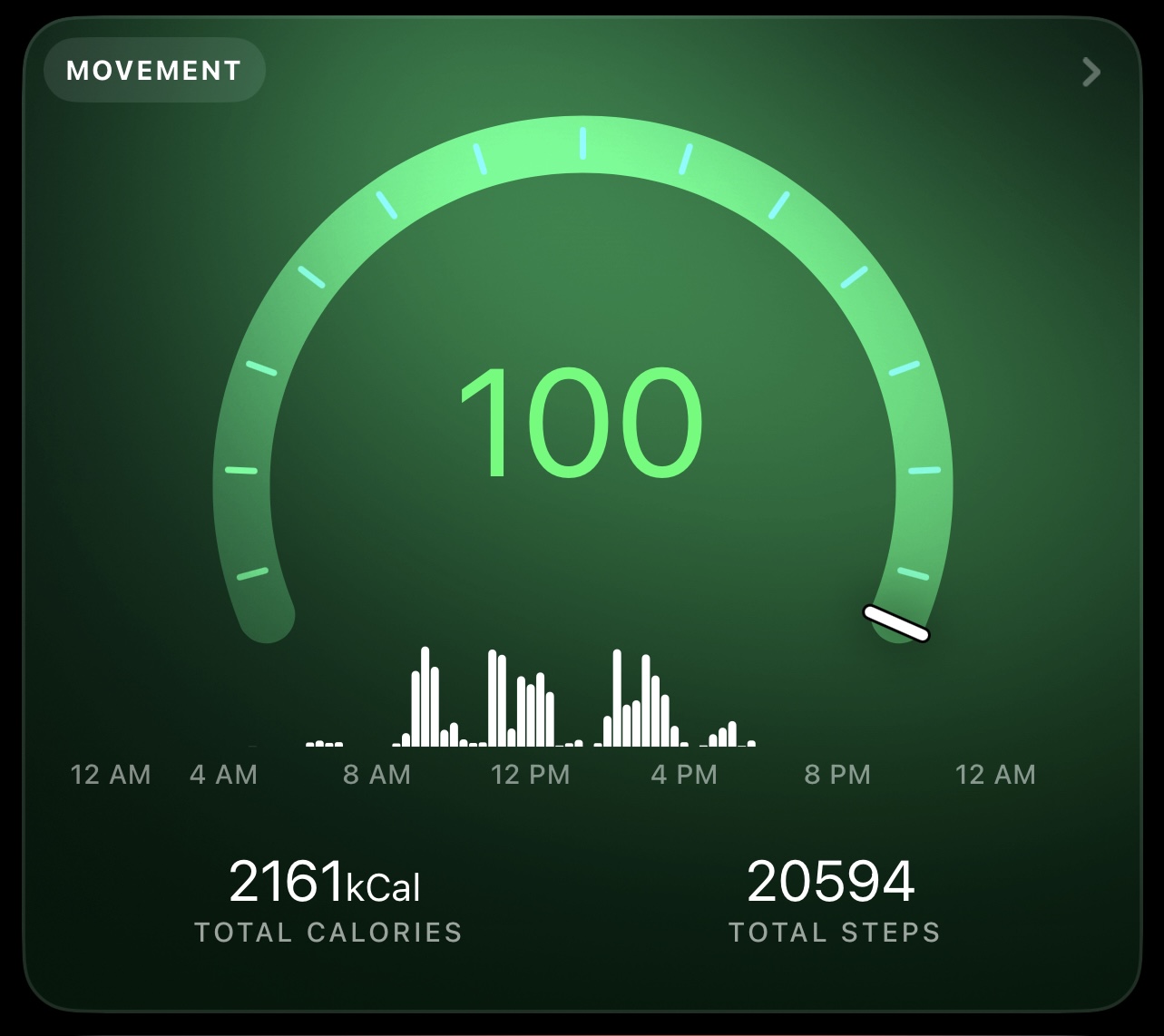
Evening Routine:
Evening adhkar: recite the evening adhkar on the Dhikr & Dua app.
أَمْسَيْنَا وَأَمْسَى الْمُلْكُ لِلّٰهِ وَالْحَمْدُ لِلّٰهِ ، لَا إِلٰهَ إِلَّا اللّٰهُ وَحْدَهُ لَا شَرِيْكَ لَهُ ، لَهُ الْمُلْكُ وَلَهُ الْحَمْدُ ، وَهُوَ عَلَىٰ كُلِّ شَيْءٍ قَدِيْرٌ ، رَبِّ أَسْأَلُكَ خَيْرَ مَا فِيْ هٰذِهِ اللَّيْلَةِ وَخَيْرَ مَا بَعْدَهَا ، وَأَعُوْذُ بِكَ مِنْ شَرِّ مَا فِيْ هٰذِهِ اللَّيْلَةِ وَشَرِّ مَا بَعْدَهَا ، رَبِّ أَعُوْذُ بِكَ مِنَ الْكَسَلِ وَسُوْءِ الْكِبَرِ ، رَبِّ أَعُوْذُ بِكَ مِنْ عَذَابٍ فِي النَّارِ وَعَذَابٍ فِي الْقَبْرِ.
We have entered the evening and at this very time the whole kingdom belongs to Allah. All praise is due to Allah. There is no god worthy of worship except Allah, the One; He has no partner with Him. The entire kingdom belongs solely to Him, to Him is all praise due, and He is All-Powerful over everything. My Lord, I ask You for the good that is in this night and the good that follows it, and I seek Your protection from the evil that is in this night and from the evil that follows it. My Lord, I seek Your protection from laziness and the misery of old age. My Lord, I seek Your protection from the torment of the Hell-fire and the punishment of the grave.
Floor time: Lay on the floor and do nothing (corpse pose), legs up the wall and spine to the floor to activate your parasympathetic nervous state (rest + digest), evening walk.
Evening sun + earth time: I try to get sunlight in my eyes to regulate my sleep-wake cycle (circadian rhythm) to help with melatonin production usually by sitting outside, reading, or on my laptop. There’s a saying called “go touch grass” aka get back in touch with reality and I literally love doing that on a daily basis as part of my self-care routine aka grounding.
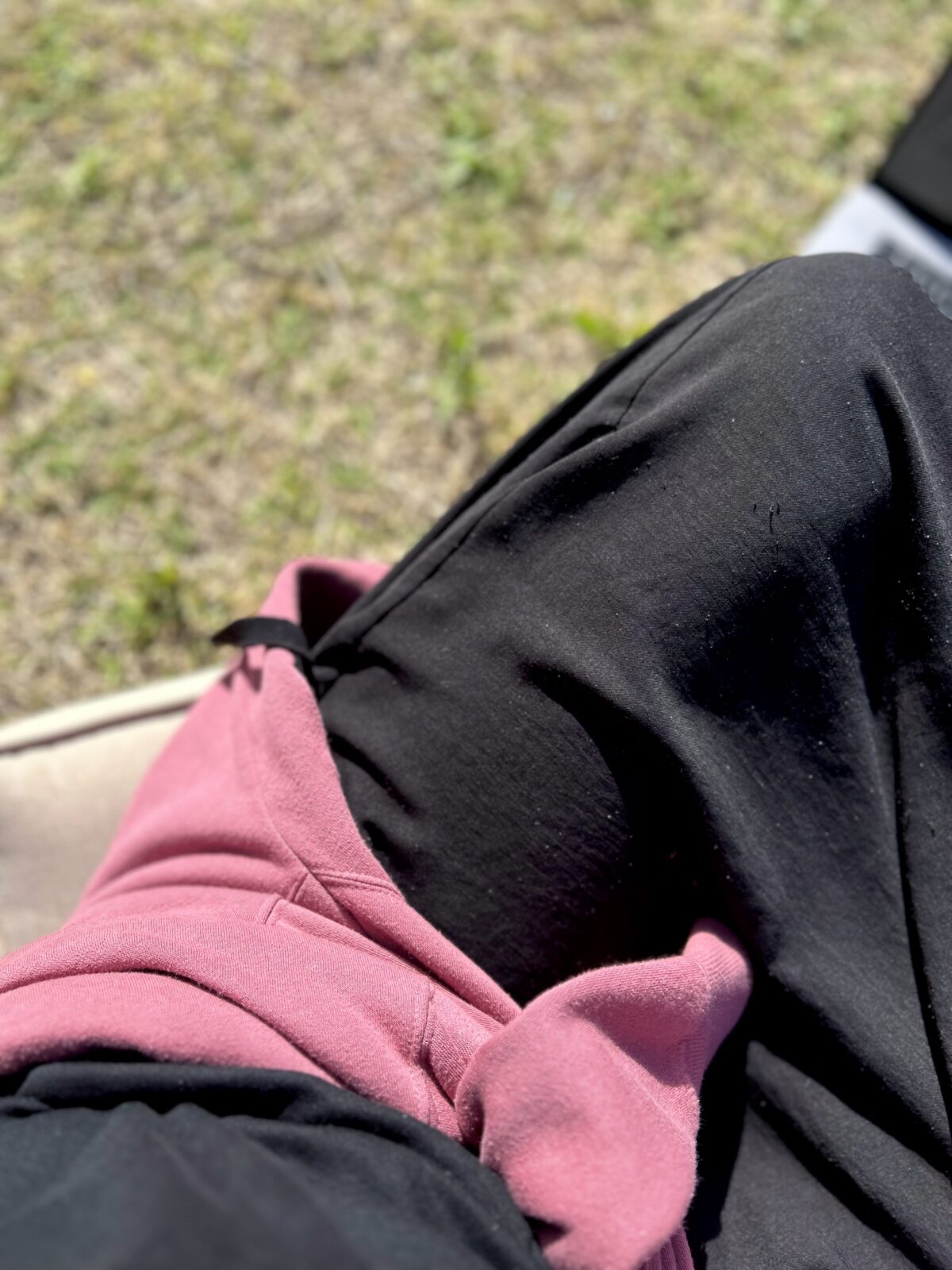
Bedtime Routine:
Bedtime routine: Surah Al-Mulk nightly (Benefits: protection from the punishment of the grave and by understanding what is being recited you are reminded at the end of the day who is in control of everything which is the best nervous system relaxation technique.) Sometimes an ASMR youtube video since it helps me relax. Legs up the wall. White musk incense burning.
Dua Before Sleeping: بِاسْمِكَ اللَّهُمَّ أَمُوتُ وَأَحْيَا In Your name Oh Allah, I live and die.
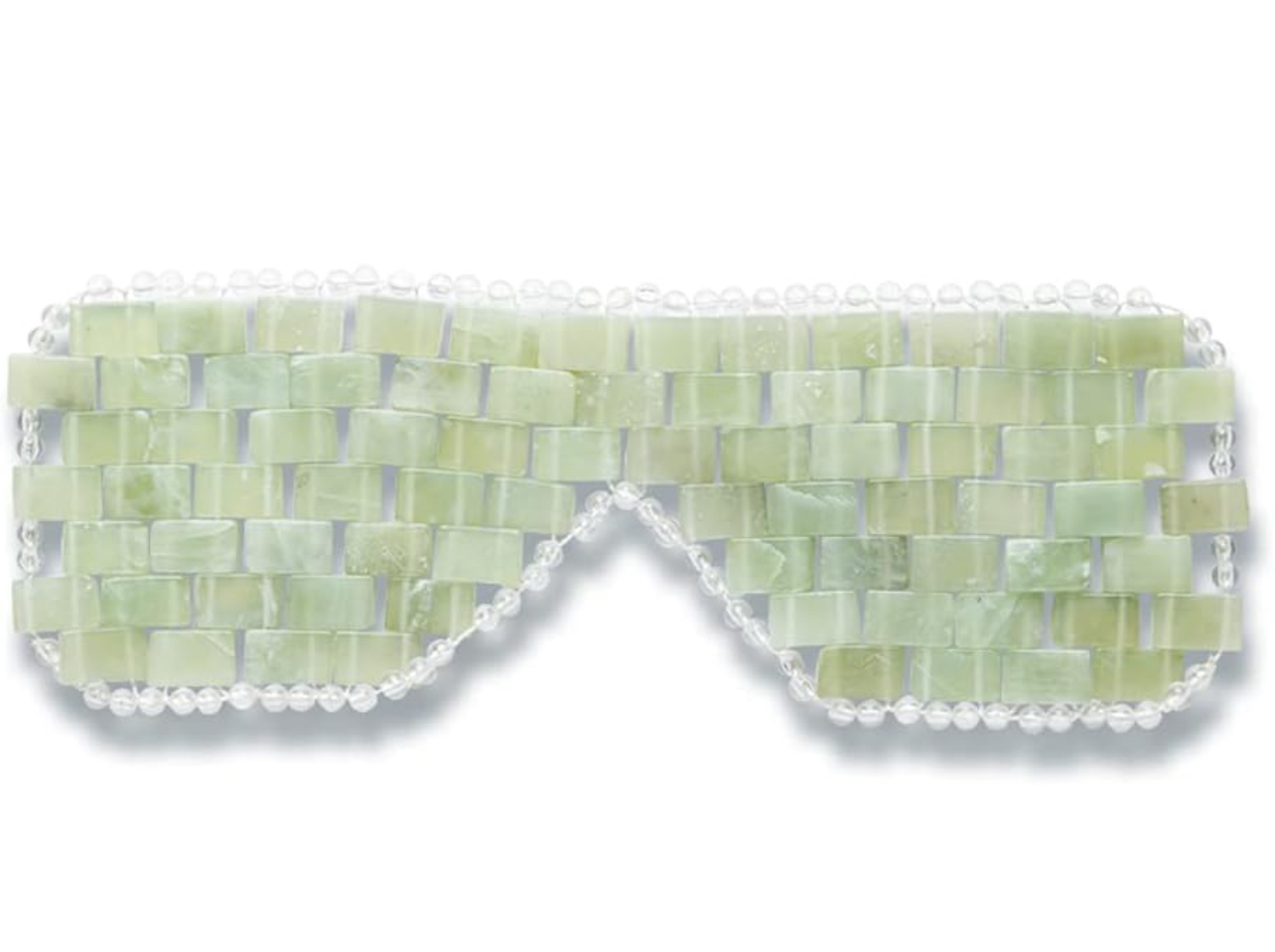
Self-Care Routine:
Self-care routine: in between sessions I might decide to nourish my hair with a hair mask concoction of Palestinian extra virgin olive oil and carol’s daughter mimosa hair honey or 7 oil blend scalp & hair oil.
- Carol’s Daughter Goddess Strength 7 Oil Blend Scalp & Hair Oil
- Carol’s Daughter Mimosa Hair Honey
- Carol’s Daughter Black Vanilla Shampoo
- Carol’s Daughter Black Vanilla Conditioner
- Lavender Herbal Body Wash
- Exfoliating dry brush for lymphatic massage/lymphatic drainage
- Lavender essential oil to place on neck + wrists
- Lip sugar scrub with pomegranate seeds + rosehip oil
- Aquaphor
- Summer friday’s vanilla + vanilla beige lip butter balm
- Juicy Blackberry Beeswax Lip Balm
- Kumbala Made Vanilla Musk fragrance oil
- Shiseido Eyelash Curler
- Kitsch Charcoal Satin Heatless Curling Set
Working alongside my cycle not against it:
I revolve my work schedule, eating habits, and workouts based on where I am at in my cycle which I track using my ultrahuman ring:
Menstrual phase:
I place more of an emphasis on rest/relaxing and nourishing my body due to the drop in estrogen and progesterone. This phase reminds me to slow down when it comes to work.
I consume more loose leaf herbal tea blends (nettle, red raspberry leaf, ginger + anise + fennel, rose bud) during this phase. Focus on supporting gut health by consuming polyphenol-rich foods like berries and fermented foods that contain live probiotics (beneficial bacteria) like kimchi, pickles, or homemade yogurt.
Consume prebiotic and probiotic-rich foods to improve gut health like fiber and various forms of fermented foods. Around 90% of serotonin and 50% of dopamine is produced in the gut by specific gut bacteria species.
Eat a variety of polyphenol-rich (colorful plants) foods for optimal gut health which help produce short-chain fatty acids like butyrate which nourish your gut lining and support a healthy mood. Aim for diversity—the more plant variety, the more your gut microbiome thrives!
List of foods high in polyphenols:
- Fruits: black chokeberry, blueberries, raspberries, strawberries, pomegranates, grapes, cranberries, acai berries, elderberries, goji berries
- Vegetables: soybeans, globe artichoke, olive leaves, spinach, kale, parsley, onions, garlic
- Grains: whole wheat, oats, barley, rye
- Nuts and Seeds: flaxseeds, hazelnuts, chestnuts, walnuts, almonds
- Spices and Herbs: cloves, turmeric, ginger, cinnamon, rosemary, thyme, oregano, basil
- Beverages: green tea, black tea, coffee, cocoa powder
Consume complex carbohydrates to support serotonin production to improve your mood like sweet potatoes, yams, lentils, sprouted oats (easier on digestion + less phytic acid), quinoa (protein + fiber), and berries. Complex carbohydrates → Tryptophan → Serotonin.
Consume tryptophan-rich foods like turkey (highest in tryptophan), free-range organic chicken, pasture-raised eggs, wild-caught salmon, and 100% grass-fed and grass-finished beef.
Consume magnesium-rich foods like spinach, dark leafy greens, nuts, and seeds.
Consume herbal teas such as nettles and red raspberry leaf to reduce PMS symptom like bloating, heavy bleeding, and cramping.
Drink 1 teaspoon of raw + unfiltered apple cider vinegar in 8 oz of water before or/and after meals to support blood sugar balance which will support overall gut health and mood.
Movement: continue walking/some form of movement to ease the symptoms associated with hormone drops (low mood + energy) during this phase.
Follicular phase:
As estrogen levels naturally rise during this phase, so does serotonin and dopamine which leads to slowly higher energy levels, improved mood, and increased stress resilience.
Ovulatory phase:
During this phase, I’m typically feeling at my best, energy levels are at their highest, optimal focus, and glowing, healthy skin is the result of peak estrogen levels.
Luteal phase:
I place more of an emphasis on taking it easy and nourishing my body during this time due to the fluctuating rises and dips in estrogen and progesterone which can impact mood, energy levels, and cravings.

Read & Leave a Comment
Share